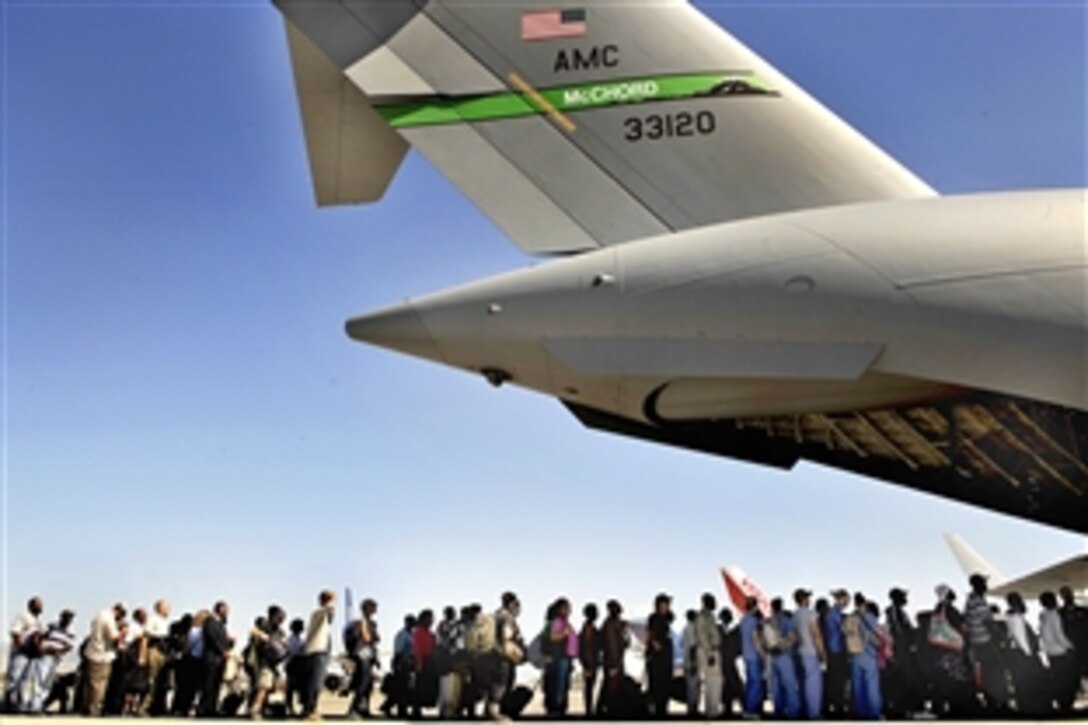Instead, the US government has used the disaster to pay itself.
Most will be quick to blame notoriously corrupt Haitian government officials and profiteers who swooped in to capitalize on the disaster for personal gain, but ironically, much of the money went to the US government, aid organizations, various other NGOs, and contractors.
Virtually none made it to the people.
Very little of the money pledged by Congress in the Haitian Rebuilding and Relief Act was allocated to the Haitian people by the end of 2010 according to the Government Accountability Office (GAO).
Of the 1.14 billion $655 million was allocated to the Department of Defense to reimburse them for relief efforts and the deployment of troops.


Haitian evacuees board a U.S. Air Force C-17 Globemaster III aircraft at the Toussaint LOuverture International Airport in Port-au-Prince, Haiti, Jan. 28, 2010.
Another $220 million was sent to the US Department of Health and Human Services, $350 million for « disaster assistance » which could be anything from medical care, to food, to sanitation. An additional $150 million went to the US Department of Agriculture, and a final $15 million was given to the Department of Homeland Security for immigration fees and airfares.
All this means that the US government spent most of the money allocated to Haitian relief on itself.
Robert Fatton Jr., professor of government and foreign affairs at the University of Virginia explained « In the end, if you read the reports – the UN Report and so on – you’ll see that actual Haitians got less than 1 percent of all the American money pledged. He continued, « 99 percent of [the US money spent] went back to the US military, the State Department, NGOs and contractors. The money was clearly intended for Haiti, but it ended up returning to the same place it came from. »
Ultimately, Congress and government officials can say they did a great service to people in need, which sounds good during election time, but in reality they gave virtually nothing to the Haitians.
When aid money is spent in Haiti, it seems it is not being spent very wisely. For example, in the early 1980’s, Haiti once produced nearly all of its own rice, importing very little to meet demands.
Now, Haiti imports cheap, subsidized rice from the US. Aid money is being spent to purchase this rice, which feeds the people but does nothing to rebuild infrastructure. Experts suggest the money would be better spent on redeveloping agriculture in the troubled country so that Haiti could once again feed itself without dependence on foreign imports. Then again, creating self sufficiency in Haiti may not be as desirable to US government officials as finding a market for US produced food.
Despite the revelations and reports, public outcry seems entirely non-existent. Few Americans seem to realize their government has duped them into believing that humanitarian aid was provided to the people of Haiti on a charitable basis. Americans gave generously only to have their government pledge support, then reclaim its contributions.
In any case, despite the tremendous outpouring of generosity and support, the people of Haiti continue to suffer needlessly. The American people have responded generously to their plight. Sadly, their government has not been as kind.
Private NGOs and Companies Scramble for Haiti Money

NGO’s in Haiti after the earthquake
From the very beginning the disaster in Haiti was looked upon as a business opportunity.
Less than a month after the quake hit, the US Ambassador Kenneth Merten sent a cable titled « THE GOLD RUSH IS ON » as part of his situation report to Washington. In this February 1, 2010 document, made public by The Nation and Wikileaks, Ambassador Merten reported the President of Haiti met with former General Wesley Clark for a sales presentation for InnoVida Holdings LLC, a Miami-based company that builds foam core houses.
Capitalizing on the disaster, Lewis Lucke, a high ranking USAID relief coordinator, met twice in his USAID capacity with the Haitian Prime Minister immediately after the quake. He then quit the agency and was hired for $30,000 a month by a Florida corporation Ashbritt and a prosperous Haitian partner to lobby for disaster contracts.
Locke said « it became clear to us that if it was handled correctly the earthquake represented as much an opportunity as it did a calamity… » Ashbritt and its Haitian partner were soon granted a $10 million no bid contract. Lucke said he was instrumental in securing another $10 million contract from the World Bank and another smaller one from CHF International before their relationship ended up in court when Lucke sued Ashbritt and his Haitian partner for nearly $500,000 in bonuses for the contracts he helped them land.
Other private groups in the US also immediately started lobbying for a share of the Haiti money. In January, the US military had to suspend medical evacuations of critically injured Haitians to hospitals in Florida after officials there formally asked the US to pay some of the medical costs of care. Florida was ultimately reimbursed more than $5 million in Haiti relief funds for helping Haitians. The Orlando Sanford Airport, which handles a million visitors a year, received $583,000 in federal funds for receiving 9500 evacuees plus volunteers and staff.
Contrast this with the Miami International airport which handled more than four times as many passengers and did not request similar federal funds, according to records reviewed by the Orlando Sentinel. Federal relief funds reimbursed the airport for $32,000 in new carpets, $160,000 in landing and ramp fees, $24,000 to reimburse the airport director for his time, and $223,000 in other staff time.
The American Red Cross reported receiving $486 million in donations for Haiti as of June 2011. It said it either spent or signed agreements to spend two-thirds or $330 million on relief and recovery efforts, though specific details are difficult to come by. Within weeks, the American Red Cross, which before the earthquake had 15 people in Haiti, had raised nearly $200 million for relief operations in Haiti. Partners in Health, which pre-earthquake had 5000 people working in Haiti, raised about $40 million.
The CEO of American Red Cross has a salary of over $500,000 per year. As of August 2011, the American Red Cross had spent less than half the money it raised for relief and reconstruction in Haiti. In March 2010 the AP reported « Tens of millions…went to U.S.-based aid groups. While much of that bought food and other necessities for Haitians, it often did so from U.S. companies — including highly subsidized rice growers whose products are undercutting local producers, driving them out of business. »

Rolling Stone, in an excellent article, reported on one $1.5 million dollar contract to the NY based consulting firm Dalberg Global Development Advisors. Dalberg’s team, according to Glenn Smucker, an anthropologist specializing in Haiti charged with briefing the team, « had never lived overseas, didn’t have any disaster experience or background in urban planning… never carried out any program activities on the ground… » and only one of them spoke French.
Despite this, the group was assigned the task of doing an assessment of a specific land area where the US hoped to create new communities in an attempt to depopulate Port-au-Prince. USAID reviewed Dalberg’s work and found that « it became clear that these people may not have even gotten out of their SUVs. Indeed one area Dalberg’s team found habitable was a small mountain with an open-mined pit, a severe 100 foot vertical cliff and ravines. »
An example of the politicization of this process can be found in the $8.6 million joint contract between the US Agency for International Development (USAID) and the Office of Foreign Disaster Assistance with the private companies CHF and Project Concern International for debris removal in Port au Prince. CHF is politically well-connected international development company with annual budget of over $200 million. The CEO was paid $451,813 in 2009. PCI is a $30+ million dollar international aid group whose CEO earned $263,219 in compensation in 2009. CHF’s connection to Republicans and Democrats is illustrated by its board secretary, Lauri Fitz-Pegado, a partner with the Livingston Group LLC.
The Livingston Group is headed by the former Republican Speaker-designate for the 106th Congress, Bob Livingston, doing lobbying and government relations. Ms. Fitz-Pegado was appointed by President Clinton to serve in the Department of Commerce and served as a member of the foreign policy expert advisor team on the Obama for President Campaign. CHF « works in Haiti out of two spacious mansions in Port au Prince and maintains a fleet of brand new vehicles » according to Rolling Stone.
Presidents George W. Bush and Bill Clinton announced a fundraising venture for Haiti on January 16, 2010. As of October 2011, the fund had received $54 million in donations. It has partnered with several Haitian and international organizations. Though most of its work appears to be admirable, it has donated $2 million to those constructing a $29 million luxury hotel in Petionville.
The reconstruction has been exceedingly slow. A December 2011 report issued by the International Red Cross found that over 100,000 homes had been completely destroyed and another 200,000 badly damaged. As a result, 1.5 million people, 20 percent of Haiti, needed shelter after the earthquake. The international community responded by providing hundreds of thousands of tarpaulins, two tarps per family, by May 2010, three and a half months after the earthquake. Though few homes are being repaired, small temporary shelters, about 12 feet by 16 feet, are being constructed at a rate of about 7000 per month. With over a half a million people still under tarps, shelter is a long way off.
An April 19, 2011 audit by the USAID Office of the Inspector General (OIG) looking at USAID efforts to provide transitional housing found that grantees completed only 7,179 transitional shelters, 22 percent of their target number, and some of those shelters were substandard. USAID made 16 grants for shelter totaled $138 million and $37.8 million had been disbursed as of January 1, 2011. USAID issued grants were based on unsolicited non-competitive proposals and the largest were awarded to Catholic Relief Services, Cooperative Housing Foundation International and World Vision.
Critics of the non-governmental organizations abound. « The NGOs still have something to respond to about their accountability, because there is a lot of cash out there, » said Nigel Fisher, the United Nation’s chief humanitarian officer in Haiti. « But what about the $1.5 to $2 billion that the Red Cross and NGOs got from ordinary people, and matched by governments, etc.? What’s happened to that? And that’s where it’s very difficult to trace those funds. »






























































